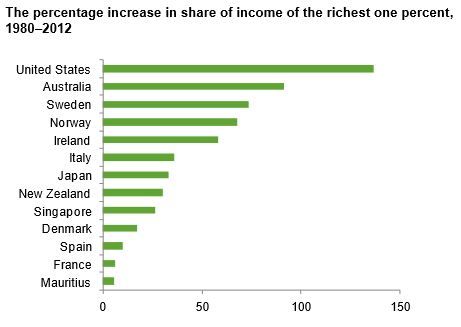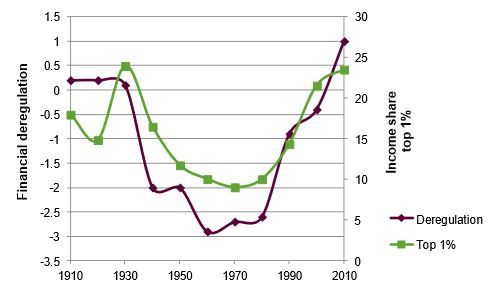A tiny elite, the 85 richest people in the world, own the wealth shared by almost half of the world’s population, says charity organization Oxfam in a new report Working for the Few. Oxfam adds that such inequality undermines democracy in a world where wealthy elites “rig the rules of the economic game.”
The new report, published to coincide with the opening of the World Economic Forum in Davos, Switzerland, demonstrates the pernicious impact of growing inequality on both developed and developing nations.
We live in a world, the authors write, in which the tiny elite undermine the democratic processes and push through policies that secure their own interests at everybody else’s expense.
A growing number of people are becoming aware of this “power-grab”. Oxfam carried out polls in six countries – the US, UK, Spain, South Africa, India and Brazil – and found that the majority of people believe the laws are tilted towards the wealthy.
Present state of things affects social stability and security
Inequality has become a top priority for many leaders. President Barack Obama says it is a key priority for 2014. The World Economic Forum issued a report in which over 700 global experts say that the widening wealth gap has the potential to cause considerable damage globally.
Source: Oxfam.
According to the World Economic Forum’s Global Outlook, published in November 2013, inequality is affecting social stability and “threatening security on a global scale.”
Reversing this trend should become a top priority, Oxfam urges governments. The charity asks those attending the World Economic Forum to make a six-point pledge to address the problem.
We must tackle inequality to fight against poverty
Oxfam Executive Director, Winnie Byanyima, who will be at the Davos meetings, said:
“It is staggering that in the 21st Century, half of the world’s population own no more than a tiny elite whose numbers could all sit comfortably in a single train carriage. We cannot hope to win the fight against poverty without tackling inequality. Widening inequality is creating a vicious circle where wealth and power are increasingly concentrated in the hands of a few, leaving the rest of us to fight over crumbs from the top table.”
“In developed and developing countries alike, we are increasingly living in a world where the lowest tax rates, the best health and education and the opportunity to influence are being given not just to the rich but also to their children.”
“Without a concerted effort to tackle inequality, the cascade of privilege and of disadvantage will continue down the generations. We will soon live in a world where equality of opportunity is just a dream. In too many countries economic growth already amounts to little more than a **winner takes all windfall for the richest.”
** A winner-takes-all market is one where just one or very few competitors take a major share of the rewards.
The richest elite have tipped the world in their favor
According to Oxfam, the richest people in the world have imposed policies over recent decades that include:
- anti-competitive business practice
- cutbacks or underinvestment in public services.
- financial deregulation
- reduced tax rates on high incomes and investments
- tax havens and secrecy
The relationship between financial deregulation and inequality in the US. (Source: Oxfam)
In 29 of the 30 nations for which data are available, tax rates for the rich have fallen since the late 1970s, i.e. in many parts of the world the rich not only become wealthier, but pay less tax too.
A US study has demonstrated compellingly that the wealthy are “overwhelmingly represented by the US Government compared with those of the middle classes. The preferences of the poorest had no impact on the votes of elected officials.”
The richest people in society have grabbed opportunities at the expense of the middle classes and the poor to such an extent that 70% of people in the world live in nations where inequality has become worse since the 1980s.
Today 1% of families own 46% of global wealth.


